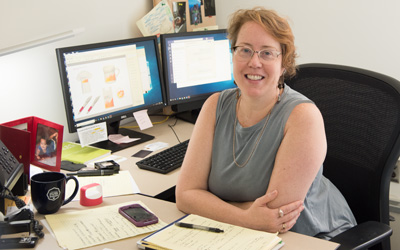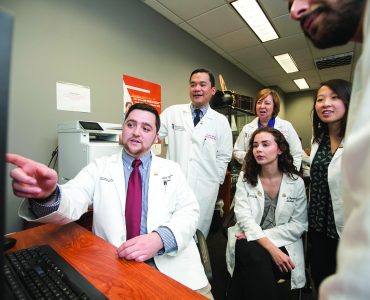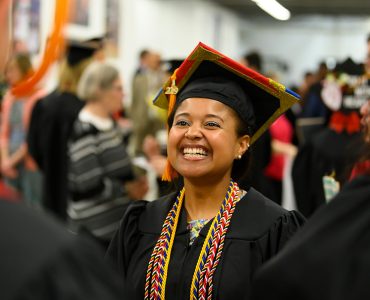“It is great knowing someone is on your side.”
This is the typical response of the 250 to 300 people a year assisted by the Rebuild, Overcome, and Rise (ROAR) Center at the University of Maryland Francis King Carey School of Law. Executive director Lydia Watts, JD, and her staff help crime survivors who fall through the cracks in Baltimore City.

While homicides and nonfatal shootings (158 and 307, respectively, through mid-June) catch the headlines, it is the people left behind by the carnage of violence whom ROAR assists. The mom whose son has been shot and is in danger of losing her job; the brother and sister who are scared to go to school; the victim who needs medical care but has no insurance or transportation; the witness to a crime who wants to flee but is locked into a lease.
ROAR’s “one-stop shop” of therapists, lawyers, social workers, case managers, intake specialists, and nurses jump into the fray, bringing a measure of stability to a life spiraling out of control.
And they do it in a humane way.
“Our clients are predominantly Black and low-income, and many systems don’t see them as fully human and deserving of respect,” said Watts, who started ROAR in January 2019 with a million-dollar grant from the Governor’s Office of Crime Prevention, Youth, and Victim Services. “We’re determined to shift that narrative. We see their beauty. We see their strength. We return their phone calls. We have empathy. We sit with them. We try our best to answer their questions: ‘Why am I being interrogated? Why was my phone taken? What is happening with my murdered son’s case?’ ”
Helping Those at Highest Risk as Victims
Vulnerable populations are at the highest risk for victimization. This includes immigrants, members of the LGBTQ+ community, people living in poverty, sex workers, and other marginalized communities because they are often viewed skeptically in all things, even when reporting a crime. Navigating the bureaucracy that faces anyone impacted by a serious crime is daunting, and particularly so if you already are struggling.
Many marginalized people also tend to distrust the police, so ROAR’s free services don’t require them to report the crime.
The cases extend beyond gun violence to victims of intimate partner violence, sexual trafficking, assaults, robberies, stalking, and hate crimes. “We help folks who have experienced all of those types of harm,” Watts said. “But 250 people is, sadly, a very small number compared to the number who have experienced that in any given year.”
ROAR is looking to do more. Its success in helping those impacted by crime and violence garnered the center a $1.5 million, three-year grant from the Mayor’s Office of Neighborhood Safety and Engagement last January. With it, Watts has fortified her “amazing” team, which now includes 17 people.
Newcomers include a former public defender to help with post-conviction issues like parole and probation revocations. They’ve brought in “a credible messenger” who was formerly incarcerated, spent much of his youth in the streets, and now has matured and “has a beautiful way of connecting with younger Black men and showing them a way of living without resorting to violence,” Watts said.
Then there is “Doc,” Joseph Richardson, PhD, MA, of the University of Maryland School of Medicine, a preeminent gun violence researcher who has been an integral part of ROAR’s successful peer healing circles with survivors of gun violence.
On May 11, the grant funded a “Centering Survivors” of gun violence event, which attracted 55 people, an open forum of victims and front-line workers. “We heard powerful stuff, mainly frustration with the system,” Watts said.
“COVID has dismantled so many things that, even though they didn’t work perfectly before the pandemic, are now very, very broken,” she said of acts like enrolling in public benefits and getting disability checks. “If the systems were responsive, then we wouldn’t need to be in there agitating on behalf of our clients. But sadly, that’s not where we’re at. So we always need more staff.”
With all the frustrations, why does Watts work in the field she’s been a part of for 30 years? “To be honest, it’s really the strength and beauty and resilience of survivors,” she said. “I mean, they’ve gone through horrifying experiences, and yet they wake up the next day, they take care of their kids. We have some clients who have lost two and even three children to gun violence. I can’t imagine enduring that kind of loss. So I feel it’s an honor that they’re allowing me into their lives, opening up to me and my staff about what they need.”
ROAR has received funding from partners including the Annie E. Casey Foundation, the Stulman Foundation, Open Society Institute-Baltimore, and the Abell Foundation. But the needs are so vast, additional support is necessary. If you would like to help Watts and her team do even more for the forgotten survivors of gun violence in Baltimore, you can make a donation here.



